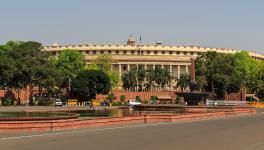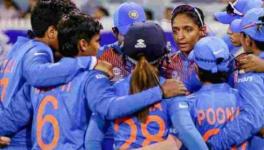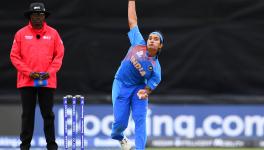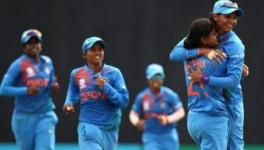Nehru’s Vision Reflects in Mamdani’s & Indian Women’s Cricket Team’s Victory

New York City Mayor-elect Zohran Mamdani. Image Credit: @ZohranKMamdani on X
It is heartening to note that Zohran Mamdani, in his victory speech after getting elected as New York Mayor, quoted Jawaharlal Nehru who said in his ‘Tryst with Destiny’ speech that “a moment comes, which comes but rarely in history, when we step out from the old to the new, when an age ends, and when the soul of a nation, long suppressed, finds utterance” and added that “tonight New York has stepped from the old into the new.”
An echo of that iconic speech by Nehru was also there around midnight on November 3, soon after the Indian women’s cricket team registered a comprehensive victory against South Africa in the finals and became world champions in one-day cricket. A commentator, while complimenting wicketkeeper Richa Ghosh, joyously said, “At the stroke of midnight the Indian women's cricket team had made their own tryst with destiny.”
Only after uttering those words, delivered by Nehru on the occasion of India's independence from centuries of colonial rule at the midnight of August 15,1947, did the commentator ask Richa what significance the historic victory meant for her and the whole team. He also put the question if she could believe that the Indian women’s cricket team could really do wonders in securing for it the enviable status of the world champion.
Such celebration of Nehru’s enduring legacy assumes more significance particularly when Prime Minister Narendra Modi on October 31, on Sardar Patel's 150th birth anniversary, resorted to a no-holds barred condemnation of Nehru. It is in his context that the triumph of the Indian women's cricket team needs to be seen in recapturing the vision of Nehru.
Nehru’s name resonates when a new dawn begins after a protracted period of struggle and those suffering discrimination and exclusion unchain themselves from the hands of people exercising power and might with impunity. As India’s first Prime Minister, he represented that undying spirit of freedom as much Mamdani did after he secured his victory as Mayor of New York and the Indian women’s cricket team that registered an emphatic win over South Africa.
Mamdani powerfully resonated the ‘tryst with destiny’ speech when he said, “And while we cast our ballots alone, we chose to hope together; hope over tyranny, hope over big money and small ideas”.
The bravery of nourishing hope in the face of suppression and domination is so characteristic of Nehru and was aptly reflected in Mamdani’s articulation, as well as in the triumph of the Indian women’s cricket team. Women often face insurmountable challenges of entrenched patriarchy, widespread gender discrimination, violence and brutality in all spheres of society. Therefore, the first-ever victory in a World Cup tournament of cricket, considered a religion in our country, is of seminal importance. Each member of the triumphant team represents the unbeatable spirit in summoning extraordinary courage for covering the arduous journey for success in face of the daunting problems. It is rightly stated in the context of the team's thumping victory that “In a world which has little to celebrate, the dream eleven have given Indians a rare moment of togetherness”.
Harmanpreet Kaur ‘s Winning Catch
The striking thing is that the splendid victory was clinched when the ball hit by South African player Nadine de Klerke was caught by Indian captain Harmanpreet Kaur. The victory uplifted the spirit of India like in 1983 when the World Cup was lifted the Indian cricket team led by captain Kapil Dev, after defeating West Indies, considered as the strongest team in the world at that time. Prime Minister Indira Gandhi had then famously said “I knew that India could do it”.
As many as 52 years later, the Indian women’s cricket team led by Harmanpreet Kaur proved beyond doubt that they could achieve glory on the strength of their worth and celebrate the idea of India. Their celebrations represented not hyper nationalism but inclusion. In the same way, Mamdani celebrated inclusion when he stated in his victory speech, “In this new age…we will refuse to allow those who traffic in division and hate to pit us against one another. In this moment of political darkness, New York will be the light. Here, we believe in standing up for those who love, whether you are an immigrant, a member of the trans community, one of the many black women that Donald Trump has fired from a federal job, a single mom still waiting for the cost of groceries to go down, or any one else with their back against the wall.”
In those utterances one could sense the inclusive aspects of nationalism for which Nehru stood.
The aforementioned commentator’s words “At the stroke of midnight the Indian women's cricket team had made their own tryst with destiny” echoing Nehru’s speech has assumed significance in India torn by toxic and divisive narratives peddled by the powers that be.
Jemimah Rodrigues’s Crucial Performance
The entry of the Indian team into the finals by beating the strongest Australian team in the semi-finals could not have been possible without Jemimah Rodrigues (127 not out) for which she emotionally stated that it was Jesus Christ who was with her in the field and so she could succeed in taking forward the cause of her team and of India’s honour. She and her family faced the false charge of conversion by the Hindutva forces and she was discriminated on the grounds of her faith. Her invoking Christ reminds one of Mahatma Gandhi’s example of getting inspired by Christ along with Bhakta Prahalad, Socrates, Imam Hussain and Meerabai to formulate his idea of Satyagraha to non-violently fight for our freedom as part of our ‘tryst with destiny’.
Nehru’s Vision on Women
When Nehru’ ‘tryst with destiny’ utterances were being echoed by that cricket commentator, one was reminded of his articulations on women after India’s first general election was conducted during 1951-52 and Parliament was duly constituted. On September 20, 1953, in a letter to Chief Ministers, Nehru wrote with anguish that in the political organisations, inadequate number of women were represented, but with a hopeful note, he remarked, “….the standard of Indian womanhood is high, and Indian women have brought us more credit in the world than perhaps the men. A nation cannot go far ahead unless it gives full scope to its women”.
Almost a year and four months before he made the above remarks, in a letter to the Chief Ministers on May 18, 1952, Nehru was sad to note that enough women could not be elected to the Lok Sabha and Rajya Sabha and candidly and prophetically stated that, “I am quite sure that our real and basic growth will only come when women have a full chance to play their part in public life. Wherever they have had this chance, they have, as a whole, done well, better if I may say so, than the average man. Our laws are man-made, our society dominated by man, and so most of us naturally take a very lopsided view of the matter. We cannot be objective, because we have grown up in certain grooves of thought and action. But the future of India will probably depend ultimately more upon the women than the men.”
The triumph of the Indian women’s cricket team in 2025 as world champions underling their ‘tryst with destiny’ captures the vision of Nehru that “…the future of India will probably depend ultimately more upon the women than the men.”
The writer served as Officer on Special Duty to President of India K R Narayanan. The views are personal.
Get the latest reports & analysis with people's perspective on Protests, movements & deep analytical videos, discussions of the current affairs in your Telegram app. Subscribe to NewsClick's Telegram channel & get Real-Time updates on stories, as they get published on our website.























